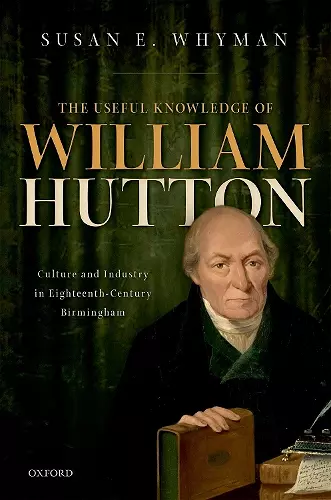The Useful Knowledge of William Hutton
Culture and Industry in Eighteenth-Century Birmingham
Format:Hardback
Publisher:Oxford University Press
Published:4th Oct '18
Should be back in stock very soon

The Useful Knowledge of William Hutton shows the rapid rise of a self-taught workman and the growing prominence of the city of Birmingham during the two major events of the eighteenth-century - the Industrial Revolution and the Enlightenment. Hutton achieved wealth, land, status, and literary fame, but later became a victim of violent riots. The book boldly claims that an understanding of the Industrial Revolution requires engagement with the figure of the 'rough diamond', a person of worth and character, but lacking in manners, education, and refinement. A cast of unpolished entrepreneurs is brought to life as they drive economic and social change, and improve their towns and themselves. The book also contends that the rise of Birmingham cannot be understood without accepting that its vibrant cultural life was a crucial factor that spurred economic growth. Readers are plunged into a hidden provincial world marked by literacy, bookshops, printing, authorship, and the spread of useful knowledge. We see that ordinary people read history and wrote poetry, whilst they grappled with the effects of industrial change. Newly discovered memoirs reveal social conflict and relationships in rare detail. They also address the problems of social mobility, income inequality, and breath-taking technological change that continue to perplex us today.
...but the detailed analysis...presents a wonderful picture... * Susan E. Whyman, The American Historical Review *
One of Whyman's strengths across this volume is her close engagement with archival material. The text is, as such, multi-voiced-we can engage with Hutton as public andprivate figure but also with a range of primary evidence, whether in his sister's letters, or the testimony, and life-histories, of others who thrived in Birmingham's entrepreneurial atmosphere. * Lynda Mugglestone, Midland History *
Whyman makes a strong argument for the importance of local culture and individual agency in facilitating British industrialization, contending that it was people like Hutton and towns like Birmingham that made industrialization possible ... her work effectively reverses the assumptions guiding many social and micro-histories that focus on identifying representative past ideas, values, and experiences. * Christopher Ferguson, Journal of British Studies *
A fascinating account. * Hannah Barker, History Today, Best History Books 2018 *
ISBN: 9780198797838
Dimensions: 242mm x 163mm x 19mm
Weight: 576g
240 pages